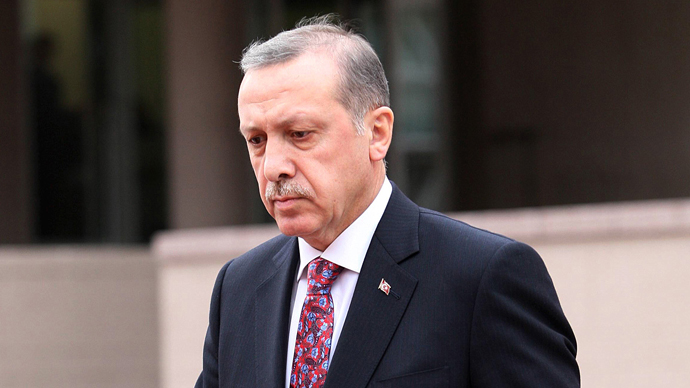‘Turkey won’t act on Syria without US blessing’
Despite harsh rhetoric, Turkey won’t take any action against the Syrian government of Bashar Assad without getting a go-ahead from Washington, Middle East expert, Jeremy Salt, told RT.
Turkish authorities have detained nine people in connection with
Saturday's deadly car bombings in a town near the Syrian
border.
Two blasts killed 46 and injured over 100 as Turkey was quick to
blame Syrian intelligence for the attack, but the government in
Damascus denies all the accusations.
Middle Eastern history and politics professor at Bilkent
University in Turkey, Jeremy Salt, says it’s the Islamists among
the Syrian rebels, who look the only party to benefit from the
attacks.
RT:Why did the Turkish government label the Syrian government as the "usual suspects" in the bombings – before the investigation even started?
Jeremy Salt: The Turkish government claims it arrested
nine people and it claims to have evidence that they’re connected
with the Syrian intelligence service. We haven’t seen that evidence
yet. We’ll have to wait and see what it says. At this stage, it
seems to me quite inconceivable that Syria would do that because if
we look at what’s happening on the ground right now. The Syrian
army is rolling back the insurgency. The insurgents have taken huge
losses in the last few months, in particular, around Damascus, near
the Lebanese border, and even around Halab – Aleppo – and in the
North Syria. And along with this is the fact that the Americans are
changing pace and are going into negotiations with Russia to come
out with a solution. So it doesn’t make any sense that Syria would
do that right now.
RT:Just in the last few hours, Syria's information
minister said that Turkish Prime Minister Erdogan's responsible for
this by playing a "dangerous game with al-Qaeda". What did he mean
by that?
JS: We know for a fact that – because the main Islamist
fighting group in Syria has admitted this – al-Qaeda in Iraq and
Jabhat al-Nusra in Syria are one in the same. And all the fighting
groups in Syria are Islamist and they’re working tactically with
Jabhat al-Nusra. So, al-Qaeda is in Syria. We know that. It’s now
confirmed, but this was more or less suspected from the start. What
we’re seeing now is kind of charge and counter-charge as people try
to put the blame for this on to someone else. My feeling about this
– and obvious kind of guess is that the party responsible for this
is one of the armed groups because if anyone has a reason to try to
heat up the situation and drag outside countries it would be them.
They’re in very serious problems right now.

RT:Turkey's Interior Minister urged the international
community to get involved against Syrian President Assad. Doesn't
this undermine the peace efforts proposed by Russia, US and the UK?
JS: The whole point is that they (the international
community) have been deeply involved for more than two years and
they haven’t succeeded in their objective, which is ultimately to
overthrow the Syrian government – to bring it down. And so they’re
still kind of chanting the same refrain, but there’s actually no
possibility that the Syrian government can be brought down without
direct intervention from outside governments. And the emphasis on
Bashar al-Assad takes the emphasis where it should be, which is the
Syrian army. Because the Syrian army is fighting – this is a
national project. The foot soldiers in the Syrian army are mainly
Sunni Muslims and, so, they have a national spirit. And that kind
of refrain that the outside government should do more, should send
in arms, should declare a no-fly zone are only going to worsen the
situation.
What we clearly need now is progress towards negotiating a solution, which is the path Obama has taken. And I think, in spite everything we’ve seen in the last couple of weeks – the chemical weapons propaganda, the Israeli attack – that I don’t think Obama is going allow himself to be drawn into this.
RT:Turkey says it will take "every kind of measure" in response. What could that be?
One has to take it seriously, but the fact is that [Turkish Prime Minister Recep Tayyip] Erdogan is going to Washington this week and Syria will be on top of the agenda and my feeling is that Turkey won’t do anything by itself – that if Obama won’t bite, if he won’t commit America to take a more involved position over Syria, I don’t think that Turkey will do anything.
Now, the key issue here is what kind of evidence are they going
to come up with. Will they come up with any evidence that’s going
to convince us that this, in fact, was an action carried out by the
Syrian intelligence services. So there are many many unknowns right
now and, of course, everything is going to depend on the outcome of
the talks in Wahington between Obama and Erdogan.
The statements, views and opinions expressed in this column are solely those of the author and do not necessarily represent those of RT.












